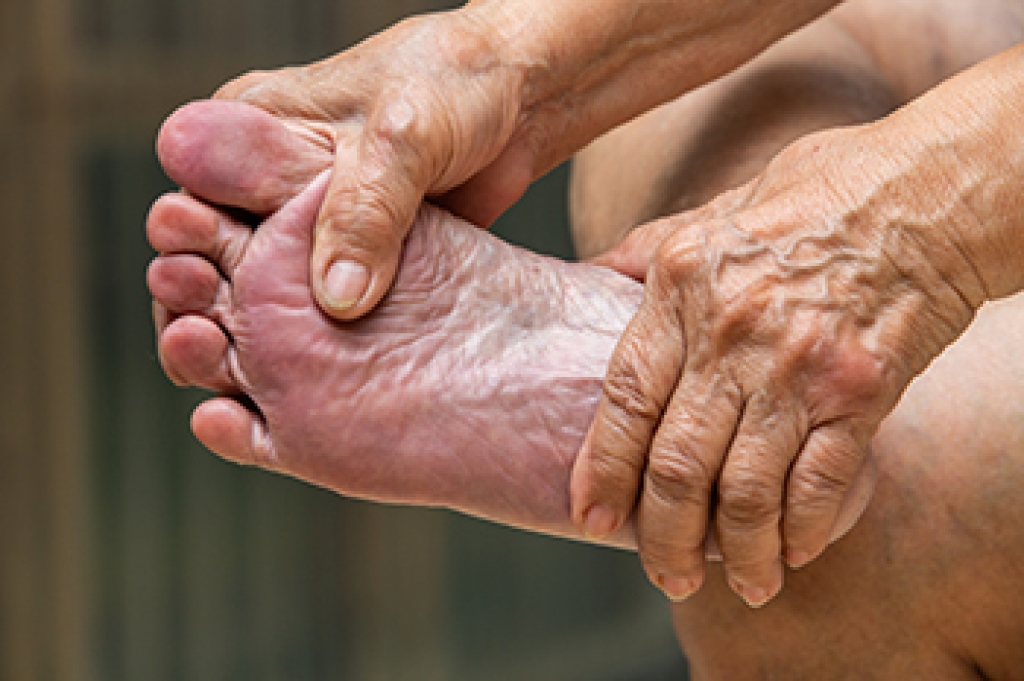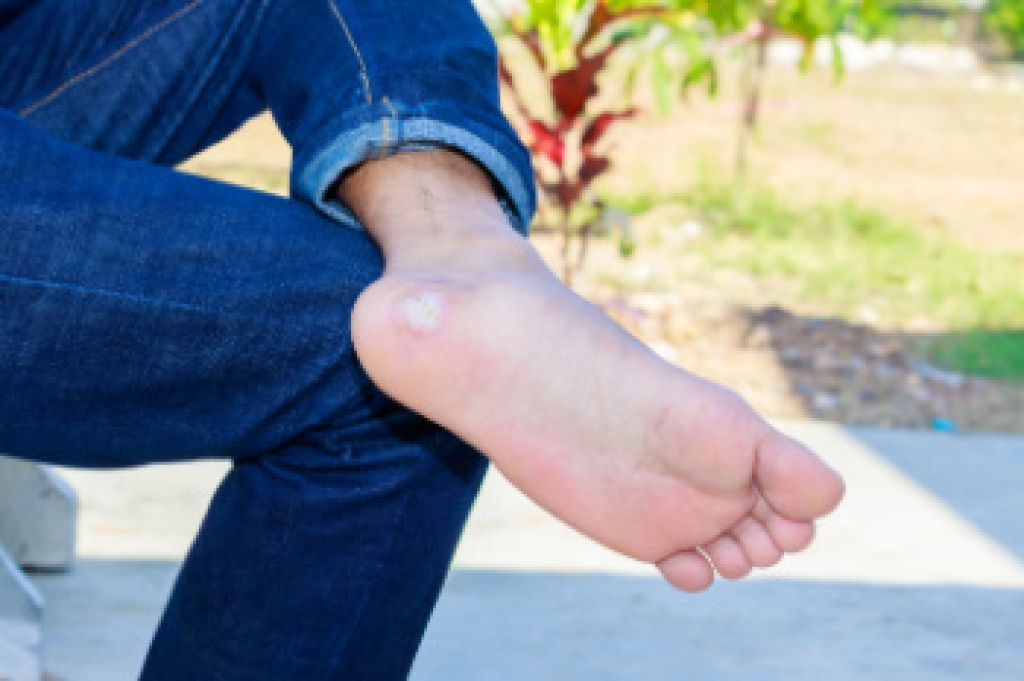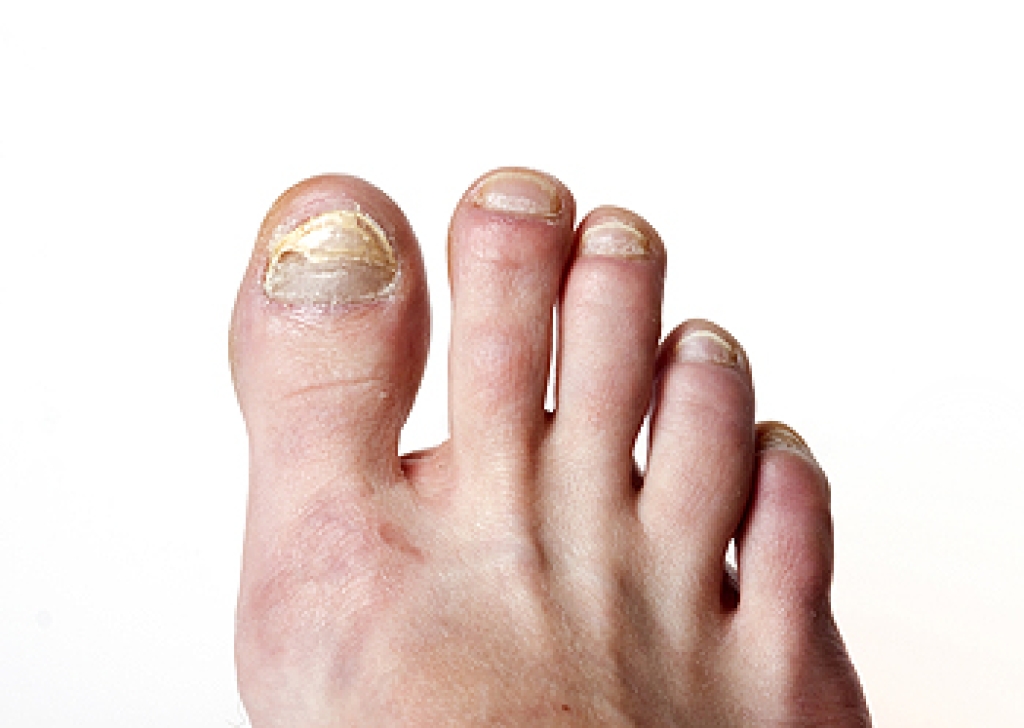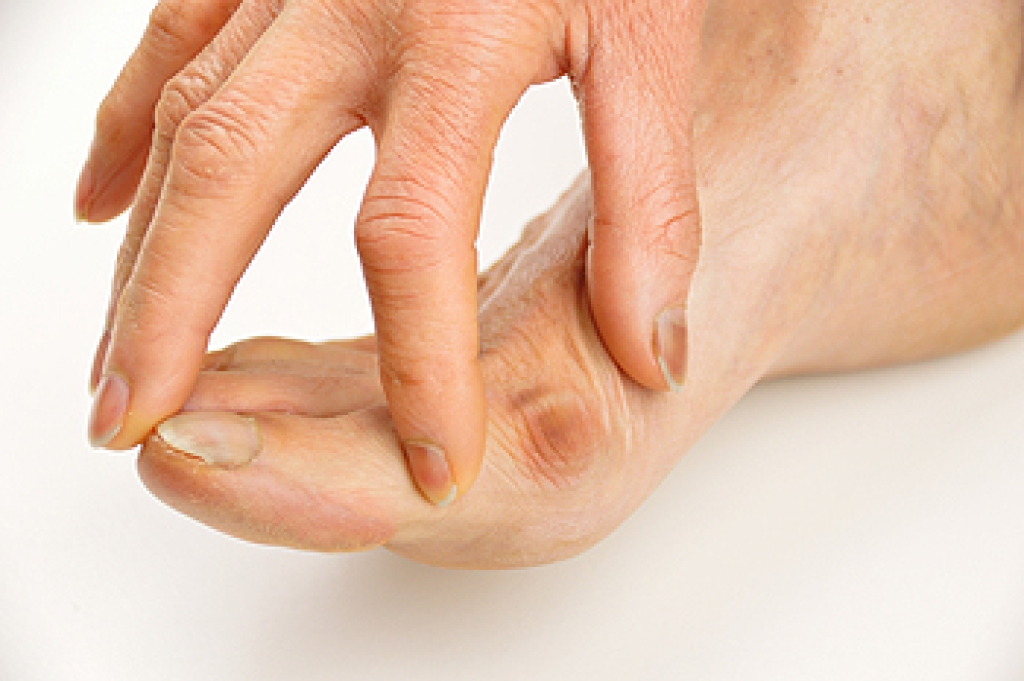Blog
The Importance of Geriatrics
 Geriatrics is a branch of medicine focused on the health care of older adults. As people age, their bodies undergo various changes, making them more susceptible to certain health conditions, including foot and ankle problems. Geriatric podiatrists specialize in diagnosing and treating these issues, particularly arthritis, diabetic foot complications, and decreased circulation. Thinning skin and age-related foot deformities are also examined. Additionally, podiatrists provide comprehensive care to help seniors maintain mobility and an independent lifestyle. Regular foot exams by a geriatric podiatrist can help prevent falls, alleviate pain, and address any concerns related to foot health in older adults. If you or a loved one are experiencing foot problems associated with aging, scheduling a consultation with a geriatric podiatrist can be beneficial. By placing emphasis on preventive measures and early intervention, geriatric podiatrists will assist in advocating for healthy aging and enhanced quality of life among older adults. For guidance on foot problems related to aging, it is suggested that you consult a geriatric podiatrist for an effective approach to maintaining a vibrant lifestyle.
Geriatrics is a branch of medicine focused on the health care of older adults. As people age, their bodies undergo various changes, making them more susceptible to certain health conditions, including foot and ankle problems. Geriatric podiatrists specialize in diagnosing and treating these issues, particularly arthritis, diabetic foot complications, and decreased circulation. Thinning skin and age-related foot deformities are also examined. Additionally, podiatrists provide comprehensive care to help seniors maintain mobility and an independent lifestyle. Regular foot exams by a geriatric podiatrist can help prevent falls, alleviate pain, and address any concerns related to foot health in older adults. If you or a loved one are experiencing foot problems associated with aging, scheduling a consultation with a geriatric podiatrist can be beneficial. By placing emphasis on preventive measures and early intervention, geriatric podiatrists will assist in advocating for healthy aging and enhanced quality of life among older adults. For guidance on foot problems related to aging, it is suggested that you consult a geriatric podiatrist for an effective approach to maintaining a vibrant lifestyle.
If you need your feet checked, contact one of our podiatrists of Columbus Podiatry & Surgery. Our podiatrists will attend to all of your foot and ankle needs and provide you with quality treatment.
Geriatrics and Podiatry
When people age, some common issues that may occur are bone density loss, dry skin, poor circulation, and rough brittle nails. These issues may also affect your foot health if the necessary steps are not taken to alleviate the problems.
It is important to take care of your feet because feet that are injured or diseased can affect your overall health. Having painful feet hinders your ability to do daily activities or may decrease your willingness to do the things that you need to do.
Visiting Your Geriatrician
As we age, health problems become more likely, so it is essential to visit your doctor for check-ups to ensure that you are doing the best you can to take care of your health. It is recommended to check your feet frequently for any possible cuts, bruises, swelling, corns or any other irregularities.
Taking Care of Elderly Feet
Cracked or dry feet can be treated by applying moisturizer often. It is also important not to wear old socks because the older the sock is, the higher the possibility there will be that there is bacteria there. Wear fresh socks and make sure they fit properly.
Proper foot health means that you can have a more active lifestyle and you will not be bogged down by pain. Foot health also leads to good circulation, which is paramount for overall health.
If you have any questions, please feel free to contact our office located in Columbus, OH . We offer the newest diagnostic tools and technology to treat your foot and ankle needs.
Plantar Warts Defined

Plantar warts are small, grainy growths that appear on the soles of the feet, typically caused by the human papillomavirus, or HPV. This virus enters the skin through tiny cuts or abrasions, often in warm, moist environments like public showers, gym locker rooms, or pools. Plantar warts are characterized by their rough texture and may have small black dots on the surface, which are clotted blood vessels. They can cause discomfort or pain, especially while walking or standing. The pressure from bearing weight on the feet can cause the wart to grow inward beneath a hard, thick layer of skin, making it more painful. Common symptoms include a painful, thickened spot on the sole, a rough surface, and difficulty in walking comfortably. If you have developed a plantar wart, it is suggested that you seek prompt attention from a podiatrist who can offer appropriate treatment techniques.
Plantar warts can be very uncomfortable. If you need your feet checked, contact one of our podiatrists from Columbus Podiatry & Surgery. Our podiatrists will assist you with all of your foot and ankle needs.
About Plantar Warts
Plantar warts are the result of HPV, or human papillomavirus, getting into open wounds on the feet. They are mostly found on the heels or balls of the feet.
While plantar warts are generally harmless, those experiencing excessive pain or those suffering from diabetes or a compromised immune system require immediate medical care. Plantar warts are easily diagnosed, usually through scraping off a bit of rough skin or by getting a biopsy.
Symptoms
- Lesions on the bottom of your feet, usually rough and grainy
- Hard or thick callused spots
- Wart seeds, which are small clotted blood vessels that look like little black spots
- Pain, discomfort, or tenderness of your feet when walking or standing
Treatment
- Freezing
- Electric tool removal
- Laser Treatment
- Topical Creams (prescription only)
- Over-the-counter medications
To help prevent developing plantar warts, avoid walking barefoot over abrasive surfaces that can cause cuts or wounds for HPV to get into. Avoiding direct contact with other warts, as well as not picking or rubbing existing warts, can help prevent the further spread of plantar warts. However, if you think you have developed plantar warts, speak to your podiatrist. He or she can diagnose the warts on your feet and recommend the appropriate treatment options.
If you have any questions, please feel free to contact our office located in Columbus, OH . We offer the newest diagnostic and treatment technologies for all your foot care needs.
Causes of Toenail Fungus
 Toenail fungus, also known as onychomycosis, is caused by a fungal infection. It can also be triggered by psoriasis, a chronic autoimmune skin disorder that affects the skin and nails, causing thickening, scaling, and inflammation. When psoriasis affects the nails, it can create pits, ridges, and discoloration, making them more likely to develop a fungal infection. Fungi thrive in warm, moist environments, such as sweaty socks and shoes. Additionally, fungi can be picked up by walking barefoot in communal spaces, such as locker rooms or swimming pool areas. Individuals with a weakened immune system, diabetes, or poor circulation are more likely to develop issues with toenail fungus. Injuries to the toenail, such as ongoing pressure or trauma, may provide opportunities for fungi to infect the nail bed. Practicing good foot hygiene, wearing breathable footwear, and avoiding walking barefoot in public areas can help prevent exposure to toenail fungus. If an infection occurs, it is suggested to seek prompt treatment from a podiatrist to prevent it from spreading and to restore the health of your toenails.
Toenail fungus, also known as onychomycosis, is caused by a fungal infection. It can also be triggered by psoriasis, a chronic autoimmune skin disorder that affects the skin and nails, causing thickening, scaling, and inflammation. When psoriasis affects the nails, it can create pits, ridges, and discoloration, making them more likely to develop a fungal infection. Fungi thrive in warm, moist environments, such as sweaty socks and shoes. Additionally, fungi can be picked up by walking barefoot in communal spaces, such as locker rooms or swimming pool areas. Individuals with a weakened immune system, diabetes, or poor circulation are more likely to develop issues with toenail fungus. Injuries to the toenail, such as ongoing pressure or trauma, may provide opportunities for fungi to infect the nail bed. Practicing good foot hygiene, wearing breathable footwear, and avoiding walking barefoot in public areas can help prevent exposure to toenail fungus. If an infection occurs, it is suggested to seek prompt treatment from a podiatrist to prevent it from spreading and to restore the health of your toenails.
For more information about treatment, contact one of our podiatrists of Columbus Podiatry & Surgery. Our podiatrists can provide the care you need to keep you pain-free and on your feet.
Toenail Fungus Treatment
Toenail fungus is a condition that affects many people and can be especially hard to get rid of. Fortunately, there are several methods to go about treating and avoiding it.
Antifungals & Deterrence
Oral antifungal medicine has been shown to be effective in many cases. It is important to consult with a podiatrist to determine the proper regiment for you, or potentially explore other options.
Applying foot powder on the feet and shoes helps keep the feet free of moisture and sweat.
Sandals or open toed shoes – Wearing these will allow air movement and help keep feet dry. They also expose your feet to light, which fungus cannot tolerate. Socks with moisture wicking material also help as well.
If you have any questions please feel free to contact our office located in Columbus, OH . We offer the newest diagnostic tools and technology to treat your foot and ankle needs.
Bunion Relief
 A bunion is a bony bump that forms on the joint at the base of the big toe, causing it to deviate towards the other toes. This condition, known as hallux valgus, can result from genetic predisposition, wearing tight or narrow shoes, arthritis, or stress on the foot. Symptoms include pain, swelling, redness, and difficulty in walking. Additionally, the skin over the bunion may gradually become thickened and tender. Diagnosis typically involves a physical examination and X-rays to assess the severity and underlying bone structure. Treatment options range from conservative methods such as wearing wider shoes, using orthotic devices, and taking anti-inflammatory medications, to more invasive procedures like bunion surgery for severe cases. Untreated bunions can lead to complications such as chronic pain, bursitis, hammertoe, and difficulty finding comfortable footwear. If you have a bunion that is causing you discomfort, it is suggested that you schedule an appointment with a podiatrist for a tailored treatment plan.
A bunion is a bony bump that forms on the joint at the base of the big toe, causing it to deviate towards the other toes. This condition, known as hallux valgus, can result from genetic predisposition, wearing tight or narrow shoes, arthritis, or stress on the foot. Symptoms include pain, swelling, redness, and difficulty in walking. Additionally, the skin over the bunion may gradually become thickened and tender. Diagnosis typically involves a physical examination and X-rays to assess the severity and underlying bone structure. Treatment options range from conservative methods such as wearing wider shoes, using orthotic devices, and taking anti-inflammatory medications, to more invasive procedures like bunion surgery for severe cases. Untreated bunions can lead to complications such as chronic pain, bursitis, hammertoe, and difficulty finding comfortable footwear. If you have a bunion that is causing you discomfort, it is suggested that you schedule an appointment with a podiatrist for a tailored treatment plan.
If you are suffering from bunion pain, contact one of our podiatrists of Columbus Podiatry & Surgery. Our podiatrists can provide the care you need to keep you pain-free and on your feet.
What Is a Bunion?
Bunions are painful bony bumps that usually develop on the inside of the foot at the joint of the big toe. As the deformity increases over time, it may become painful to walk and wear shoes. Women are more likely to exacerbate existing bunions since they often wear tight, narrow shoes that shift their toes together. Bunion pain can be relieved by wearing wider shoes with enough room for the toes.
Causes
- Genetics – some people inherit feet that are more prone to bunion development
- Inflammatory Conditions - rheumatoid arthritis and polio may cause bunion development
Symptoms
- Redness and inflammation
- Pain and tenderness
- Callus or corns on the bump
- Restricted motion in the big toe
In order to diagnose your bunion, your podiatrist may ask about your medical history, symptoms, and general health. Your doctor might also order an x-ray to take a closer look at your feet. Nonsurgical treatment options include orthotics, padding, icing, changes in footwear, and medication. If nonsurgical treatments don’t alleviate your bunion pain, surgery may be necessary.
If you have any questions, please feel free to contact our office located in Columbus, OH . We offer the newest diagnostic and treatment technologies for all your foot care needs.

